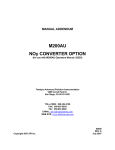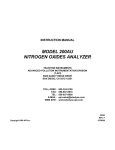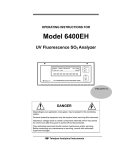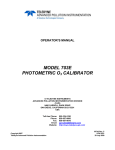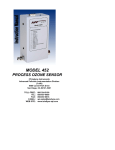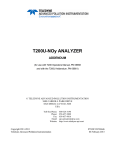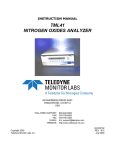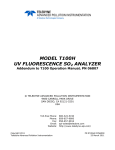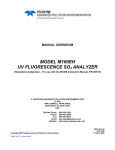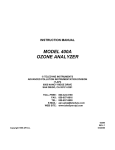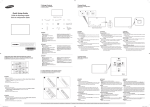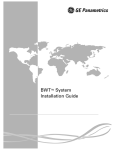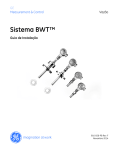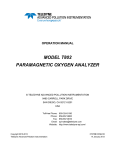Download Teledyne 05386D User's Manual
Transcript
M200EU-NOy CONVERTER ADDENDUM (for use with M200E Operators Manual, PN 04410 and with the M200EU Addendum, PN 05385) © TELEDYNE ADVANCED POLLUTION INSTRUMENTATION 9480 CARROLL PARK DRIVE SAN DIEGO, CA 92121-5201 USA Toll-free Phone: Phone: Fax: Email: Website: Copyright 2009-2010 Teledyne Advanced Pollution Instrumentation 800-324-5190 858-657-9800 858-657-9816 [email protected] http://www.teledyne-api.com/ Part Number 05386D DCN5822 23 August 2010 Safety Messages Important safety messages are provided throughout this manual for the purpose of avoiding personal injury or instrument damage. Please read these messages carefully. Each safety message is associated with a safety alert symbol, and are placed throughout this manual and inside the instrument. The symbols with messages are defined as follows: WARNING: Electrical Shock Hazard HAZARD: Strong oxidizer GENERAL WARNING/CAUTION: Read the accompanying message for specific information. CAUTION: Hot Surface Warning Do Not Touch: Touching some parts of the instrument without protection or proper tools could result in damage to the part(s) and/or the instrument. Technician Symbol: All operations marked with this symbol are to be performed by qualified maintenance personnel only. Electrical Ground: This symbol inside the instrument marks the central safety grounding point for the instrument. CAUTION This instrument should only be used for the purpose and in the manner described in this manual. If you use this instrument in a manner other than that for which it was intended, unpredictable behavior could ensue with possible hazardous consequences. NEVER use any gas analyzer to sample combustible gas(es)! Note For Technical Assistance regarding the use and maintenance of this instrument or any other Teledyne API product, contact Teledyne API’s Customer Service Department: Telephone: 800-324-5190 Email: [email protected] or access any of the service options on our website at http://www.teledyne-api.com/ 05386 Rev. D i ii 05386 Rev. D Table of Contents Safety Messages ...................................................................................................................................... i Table of Contents................................................................................................................................... iii List of Figures ........................................................................................................................................ iv List of Tables.......................................................................................................................................... iv 1.0 INTRODUCTION .................................................................................................. 5 2.0 GETTING STARTED ............................................................................................ 7 2.1 Unpacking................................................................................................................................... 7 2.2 Electrical and Pneumatic Connections ......................................................................................... 7 2.3 Initial Operation................................................................................................................................ 9 3.0 SPECIFICATIONS, WARRANTY........................................................................... 11 3.1 Specifications................................................................................................................................. 11 3.2 Warranty ......................................................................................................................................... 12 4.0 THE M200EU-NOY CONVERTER .......................................................................... 13 4.1 Principle of Operation ................................................................................................................... 13 5.0 CALIBRATION AND ZERO/SPAN CHECKS ........................................................ 15 5.1 Calibration or Cal Check Procedure ............................................................................................ 16 6.0 MAINTENANCE ..................................................................................................... 19 6.1 Maintenance Schedule .................................................................................................................. 19 6.2 Replacing the Sample Particulate Filters .................................................................................... 20 6.3 Checking Analyzer Flow Rate ...................................................................................................... 22 6.4 Replacing the Converter ............................................................................................................... 22 6.5 Inspecting Pneumatic Lines ......................................................................................................... 24 6.6 Checking for Leaks........................................................................................................................ 27 7.0 TROUBLESHOOTING, ADJUSTMENTS........................................................... 29 7.1 Operation Verification – Diagnostic Techniques .......................................................................30 7.1.1 Pneumatic System..................................................................................................................... 30 7.1.2 Leak Check................................................................................................................................ 32 7.1.3 Bypass Pump Diagnostic Procedures .......................................................................................32 7.1.4 Electrical Fault Isolation............................................................................................................. 32 7.2 Setting the Converter Temperature ............................................................................................. 32 7.2.1 Temperature Controller Setup.................................................................................................. 32 05386 Rev. D iii 8.0 M200EU-NOY SPARE PARTS LIST ...................................................................... 37 List of Figures FIGURE 1 FIGURE 2 FIGURE 3 FIGURE 4 FIGURE 5 FIGURE 6 REAR PANEL PNEUMATIC CONNECTIONS ................................................................................ 8 REPLACING THE PARTICULATE FILTER ................................................................................. 21 NOY CONVERTER ASSEMBLY ...................................................................................................... 23 PNEUMATICS DIAGRAM (STANDARD AND Z/S OPTION) ..................................................... 25 PNEUMATIC DIAGRAM (OPT 86 OPTION – SAMPLE DRIERS)............................................. 26 ELECTRICAL DIAGRAM ................................................................................................................. 35 List of Tables TABLE 1 FINAL TEST AND CALIBRATION VALUES .................................................................................... 9 TABLE 2. SPECIFICATIONS FOR THE CONVERTER AND THE BYPASS PUMP ................................... 11 TABLE 3 MANUAL ZERO CALIBRATION PROCEDURE - ZERO GAS THROUGH SAMPLE PORT 16 TABLE 4 ENTER EXPECTED SPAN GAS CONCENTRATIONS PROCEDURE FOR NO & NOY ......... 17 TABLE 5 SPAN CALIBRATION PROCEDURE ................................................................................................ 17 TABLE 6 PREVENTATIVE MAINTENANCE CALENDAR............................................................................ 19 TABLE 7 TEMPERATURE CONTROLLER PROGRAMMING GUIDE....................................................... 33 iv 05386 Rev. D 1.0 INTRODUCTION The M200EU-NOy converter is designed to support a NOx analyzer by converting multiple, unstable compounds grouped under the name NOy. The converter is mounted on the analyzer at the sample inlet to minimize flow time between sample in and converter, thereby optimizing measurement accuracy. This manual addendum is to be used in conjunction with the M200E operation manual and the M200EU addendum. 05386 Rev. D 5 Model 200EU-NOy Option Manual Addendum This page intentionally left blank. 6 05386 Rev. D 2.0 GETTING STARTED The NOy converter has been designed to operate with the M200EU low level NOx analyzer. 2.1 Unpacking CAUTION! Avoid personal injury: use two persons each to lift and carry the the M200EU analyzer and the Model 501 Pump Pack chassis. The M200EU with NOy Option comes in three boxes: M200EU analyzer Bypass Pump Chassis External Converter housed in a stainless enclosure, and umbilical cable assembly 1. Verify that there is no apparent shipping damage. If damage has occurred please advise shipper first, then API. (Keep original container and packaging for shipper’s inspection). 2. Before operation of the M200EU, remove the shipping screws as shown in the M200E/EU Manual. 3. Please check the voltage and frequency label on the rear panel of the instrument for compatibility with the local power before plugging in the M501Y. 2.2 Electrical and Pneumatic Connections 1. Mount the converter on a suitable mast outside of the enclosure. 2. Route the umbilical cable assembly into the shelter. 3. Locate the M200EU and Bypass Pump Chassis in close proximity, preferably mounting one over the other in a 19” rack. 4. Connect the electrical/pneumatic cable fittings to the rear of the Bypass Pump Chassis. Use the tags on each tube and Figure 1 to match up the correct tube with the rear panel bulkhead fitting. Please note that the dashed lines show optional Zero/Span Valve configuration connections. 5. Connect the 7-pin power and signal cable to the connector on the rear of the Bypass Pump Chassis. 6. Connect the power cord to the correct line voltage. WARNING! 05386 Rev. D Lethal voltages are present inside the chassis. Do not operate with cover off during normal operation Before operation, check for correct input voltage and frequency. Do not operate without proper chassis grounding Do not defeat the ground wire on power plug Turn off power before disconnecting electrical subassemblies 7 Model 200EU-NOy Option Manual Addendum Figure 1 Rear Panel Pneumatic Connections 8 05386 Rev. D Model 200EU-NOy Option Manual Addendum 2.3 Initial Operation 1. After confirming proper supply voltage, turn on the instrument power. If you are unfamiliar with the M200EU with NOy Option, we recommend that you read the overview in Section 3 before proceeding. The power indicator light and display should immediately light, in addition the bypass pump should start up. The Bypass Pump Chassis requires about 30 minutes for the converter to come up to temperature. While the converter is coming up to temperature, the M200EU analyzer should be powered-up. Also, follow the instructions in the M200E Manual and the M200EU Addendum to confirm proper operation of that instrument. Note: It will take 30 minutes for the ozone generator to start up in the M200EU. During that time the instrument will not respond to span gas. After 30 min, the display on the Bypass Pump Chassis should read 315oC, indicating that the converter is up to temperature. 2. Proceed to Section 4 of this manual to do a Zero/Span check. Table 1 Final Test and Calibration Values Test Values Observed Value Units Nominal Range CONVERTER TEMP o 315 7 BYPASS FLOW – NO CHANNEL CC/MIN 800 80 BYPASS FLOW – NOy CHANNEL CC/MIN 800 ± 80 C Converter Serial # __________________________ Date 05386 Rev. D _______________________ Technician _____________________ 9 Model 200EU-NOy Option Manual Addendum This page intentionally left blank. 10 05386 Rev. D 3.0 SPECIFICATIONS, WARRANTY 3.1 Specifications Table 2. Specifications for the converter and the Bypass Pump Remotely mounted molybdenum converter with temperature controller in a NEMA – 4 enclosure. Converter Temperature 315oC 7oC with read-out on front panel of bypass pump chassis. Tube/Electrical Cable Up to 50 feet (15 m) maximum length Assembly Power, Bypass Pump 120V~ 60 Hz, 230V~ 50 Hz 360 watts Assembly Power, Converter 120V~ 50/60 Hz, 60 watts Assembly Converter Efficiency >96% for NO2 Weight, Bypass Pump 35 lbs (16 kg) Assembly Weight, Remote 30 lbs (11 kg) Converter Bypass Pump Chassis 9" x17" x23.6" (23cm x 43cm x 61cm) Dimensions HxWxD Remote Converter Assy 12"x19"x7" (31cm x 48cm x 18cm) Dimensions HxWxD Environmental Installation Category (Over-voltage Category) II Pollution Degree 2 Bypass Flowrate 800 cc/min 10%, each channel Cal gas Flowrate 4000 cc/min (approx.) Analog output Converter temp analog output. 3.15 VDC = 315oC Converter 05386 Rev. D 11 Model 200EU-NOy Option Manual Addendum 3.2 Warranty TELEDYNE ADVANCED POLLUTION INSTRUMENTATION, INC. 02024c Prior to shipment, API equipment is thoroughly inspected and tested. Should equipment failure occur, API assures its customers that prompt service and support will be available. COVERAGE After the warranty period and throughout the equipment lifetime, API stands ready to provide on-site or inplant service at reasonable rates similar to those of other manufacturers in the industry. All maintenance and the first level of field troubleshooting are to be performed by the customer. NON-API MANUFACTURED EQUIPMENT Equipment provided but not manufactured by API is warranted and will be repaired to the extent and according to the current terms and conditions of the respective equipment manufacturers warranty. GENERAL API warrants each Product manufactured by API to be free from defects in material and workmanship under normal use and service for a period of one year from the date of delivery. All replacement parts and repairs are warranted for 90 days after the purchase. If a Product fails to conform to its specifications within the warranty period, API shall correct such defect by, in API's discretion, repairing or replacing such defective Product or refunding the purchase price of such Product. The warranties set forth in this section shall be of no force or effect with respect to any Product: (i) that has been altered or subjected to misuse, negligence or accident, or (ii) that has been used in any manner other than in accordance with the instruction provided by API or (iii) not properly maintained. THE WARRANTIES SET FORTH IN THIS SECTION AND THE REMEDIES THEREFORE ARE EXCLUSIVE AND IN LIEU OF ANY IMPLIED WARRANTIES OF MERCHANTABILITY, FITNESS FOR PARTICULAR PURPOSE OR OTHER WARRANTY OF QUALITY, WHETHER EXPRESSED OR IMPLIED. THE REMEDIES SET FORTH IN THIS SECTION ARE THE EXCLUSIVE REMEDIES FOR BREACH OF ANY WARRANTY CONTAINED HEREIN. API SHALL NOT BE LIABLE FOR ANY INCIDENTAL OR CONSEQUENTIAL DAMAGES ARISING OUT OF OR RELATED TO THIS AGREEMENT OF API'S PERFORMANCE HEREUNDER, WHETHER FOR BREACH OF WARRANTY OR OTHERWISE. TERMS AND CONDITIONS All units or components returned to Teledyne API should be properly packed for handling and returned freight prepaid to the nearest designated Service Center. After the repair, the equipment will be returned, freight prepaid. 12 05386 Rev. D 4.0 THE M200EU-NOY CONVERTER 4.1 Principle of Operation The T-API Model M200EU with NOy Option is designed to measure the concentration of NO, NO2, and other compounds that are too unstable to be measured when taken in through the normal ambient air sample inlet system. Please refer to the M200EU manual supplied with this system for a general discussion of the operation of a NOx analyzer. The suite of compounds known collectively as NOy is composed of roughly 30 compounds. There is some disagreement over whether certain compounds should be on the list. The NOy measurement is generally done in conjunction with a standard NOx measurement, with the difference between the two being the concentration of the unstable compounds, sometimes referred to as NOz. The analyzer measures two independent gas streams. One bypasses the external converter and measures NO in the sample. The other pulls the sample through the external converter and is displayed as NOy. Under normal calibration conditions the NOy measurement is equivalent to the delivered NOx calibration gases. The system is composed of 3 modules: The M200EU analyzer, without a Moly converter. This is the location of the optional Zero/Span Valves. A Bypass Pump Module containing: bypass pump flow control sample filtration moly temperature control pneumatic provisions for calibration optional sample Dryers to remove moisture Externally mounted molybdenum converter The M200EU w/NOy Option system allows the converter to be mounted at the sample inlet point. This configuration provides minimal time delay between the sample inlet port and the remotely mounted molybdenum converter. Minimizing the transit time between the sample inlet and converter enables the conversion of labile components of NOy. The equation for the conversion is: 315oC 3 NOY + Mo ---> 3 NO + MoO3 05386 Rev. D 13 Model 200EU-NOy Option Manual Addendum This page intentionally left blank. 14 05386 Rev. D 5.0 CALIBRATION AND ZERO/SPAN CHECKS Unlike most NOx analyzers, the M200EU with the NOy option does not have a sample inlet port on the rear panel of the M200EU. The sample port is located on the External Converter; therefore Zero/Span calibration is different than a normal NOx instrument. If a fitting is located at the sample port the analyzer is equipped with the Zero/Span option. Follow the steps in the M200E/EU manual to: a. Enter the expected NO and NOy span gas concentrations in the M200EU. b. Do the zero calibration procedure c. Do the span calibration procedure The analyzer always routes the zero/span gas through the external converter. In standard configuration, the calibration gas needs to be input at the “Cal in” port of the M501 Pump pack. When Zero/Span valve option is installed, zero and span gases are to be provided at the M200EU Zero and Span ports. In all cases, the calibration gas delivered must be under a small amount of pressure (2-5 psig) to overcome the resistance of the hoses. Also, there must be no venting of the Zero or Span gas to atmosphere prior to the analyzer. The gases actually vent at the external converter. Calibration gas must be provided for both the bypass system and the M200EU analyzer. Flow requirements are 0.80 LPM for NO bypass, 0.80 LPM for NOy bypass and 1 LPM for the M200EU. Calibration gas flow must be in sufficient excess (~4 LPM) to prevent any ambient air from entering the SAMPLE port on the pole. The maximum 50 ft length of tubing between the bypass Pump Module and the remote Moly converter has been proven to generate too much backpressure for some brands of calibrators. Experience to date is that while NO calibration is correct, GPT can be incorrect due to errors in dilution of the ozone. We strongly recommend that SPAN CALIBRATION be done with NO span gas. SPAN CHECKS can be done with either NO only, NO2 only or a mixture of NO and NO2 (GPT). Zero air used for all calibration procedures, including GPT, should have <1 ppt NO and NO2, less than 1 ppt of major interferents such as SO2, NH3, hydrocarbons and a dew point of -5oC or less. The calibration gasses should be from a reliable supplier, since the quality of the tank concentration values ultimately determines the accuracy of the analyzer. 05386 Rev. D 15 Model 200EU-NOy Option Manual Addendum NOTE The M200EU with the NOy Option does NOT have equivalency approval, and may not be used for EPA monitoring. 5.1 Calibration or Cal Check Procedure The calibration of the instrument can be checked or adjusted using gas introduced through the calibration port “CAL IN” on the Bypass Pump Module. The calibration gas is routed to a TEE near the sample inlet port on the remote converter assembly. Since the zero gas concentration is defined as 0 ppb, it is not necessary to enter the expected zero value. Table 3 details the zero calibration procedure. Table 3 Manual Zero Calibration Procedure - Zero Gas Through Sample Port Step Number Action Comment 1. Press CAL The M200EU enters the calibrate mode. 2. Wait For Stability Wait for reading to stabilize at zero value. Typ STB < 0.1 PPB 3. Press ZERO If you change your mind after pressing ZERO, you can still press EXIT here without zeroing the instrument. 4. Press ENTR Pressing ENTR actually changes the calculation equations. 5. Press EXIT M200EU returns to sampling. Immediately after calibration, data is not added to the DAS averages. 16 05386 Rev. D Model 200EU-NOy Option Manual Addendum Table 4 Enter Expected Span Gas Concentrations Procedure For NO & NOy Step Action Comment 1. Press CAL-CONC-NOy This key sequence causes the M200EU to prompt for the expected NOy concentration. Enter the NOy span concentration value by pressing the key under each digit until the expected value is set. 2. Press ENTR ENTR stores the expected NOy span value. 3. Press CAL-CONC-NO Now enter the expected NO span concentration as in step one. 4. Press ENTR 5. Press EXIT Pressing ENTR stores the NO span value and returns the prompt to the CONC menu. Returns instrument to SAMPLE mode. If desired, compensation for converter efficiency (CE) can be included in the NOy concentration calculation. Prior to calibration, the converter efficiency should either be set to 1.0 or determined per the procedure in the M200E manual. Table 5 Span Calibration Procedure Step Action Comment 1. Press CAL The M200EU enters the calibrate mode. 2. Wait For Stability Wait for reading to stabilize at span value. Type STB < 2 PPB 3. Press SPAN If you change your mind after pressing SPAN, you can still press EXIT here without spanning the instrument. 4. Press ENTR Pressing ENTR actually changes the calculation equations and causes the instrument to read the NO and NOy span concentrations. 5. Press EXIT M200EU returns to sampling. Immediately after calibration, data is not added to the DAS averages. 05386 Rev. D 17 Model 200EU-NOy Option Manual Addendum This page intentionally left blank. 18 05386 Rev. D 6.0 MAINTENANCE 6.1 Maintenance Schedule The schedule for preventative maintenance is presented in Table 6 below. Table 6 Preventative Maintenance Calendar Item Maintenance Interval Zero/Span Calibration Annually or after maintenance or repairs Zero/Span Checks Daily Particulate Filter Weekly as needed Ozone Flow Check every year and replace o-ring and orifice in reaction cell Ozone Dryer Filter-DFU Replace every year Sample Flow Check every 2 months Converter Check efficiency every 2 months Pneumatic Lines Check every 3 months Factory Calibration Calibrate each year or after repairs Leak Check Check every 6 months Replace bypass flow orifices Every year / as needed Rebuild bypass pump Every year 05386 Rev. D 19 Model 200EU-NOy Option Manual Addendum 6.2 Replacing the Sample Particulate Filters The particulate filter should be inspected often for signs of plugging or contamination. It is also common for dirt particles to cause instrument drift, and affect accuracy. To check and change the filter: 1. Fold down the Bypass Pump Module front panel. 2. Locate both filters on the left and right side of the Pump Module front panel. See Figure 2 for an exploded view of the filter assembly. 3. Visually inspect the filter through the glass window. 4. If the filter appears dirty, unscrew the hold-down ring, remove the Teflon o-ring and then the filter. 5. Replace the filter, being careful that the element is fully seated in the bottom of the holder. Replace the Teflon o-ring, then screw on the hold-down ring and hand tighten. NOTE: Handle the wetted surfaces as little as possible and clean with cloth prior to assembly 20 05386 Rev. D Model 200EU-NOy Option Manual Addendum Figure 2 Replacing the Particulate Filter 05386 Rev. D 21 Model 200EU-NOy Option Manual Addendum 6.3 Checking Analyzer Flow Rate The external sample pump is capable of maintaining the reaction cell pressure at less than 5.0 In-Hg-A. If a higher pressure is noted, the pump may need servicing. Check the pump and pneumatic system for leaks or rebuild pump. CAUTION! Never operate the analyzer without the ozone destruct component properly seated and connected within the pneumatic path. The ozone destruct is integrated into the converter case, at the exhaust of the reaction cell, inside the instrument. The sample flow as measured at ports “TO CONV/NO IN” and “FROM CONV/NOy IN” at the rear of the analyzer should be 1000 100 cc/min. See Figure 1 for component locations. 6.4 Replacing the Converter The heater, thermocouple, and converter assembly is designed to be replaced as a single unit. Check Figure 3 for component location. CAUTION! The converter operates at 315 C. Severe burns can result if not enough time is allowed for the assembly to cool. Do not handle assembly until it is at room temperature. 1. 2. 3. 4. 5. 6. 7. 8. 22 Turn off the power to the bypass pump at the chassis front panel Allow the converter to cool. Disconnect the gas fittings and power cable from the can. Remove the entire assembly from the chassis. a. Remove the pneumatic fittings. b. Remove the converter assembly from the chassis by loosening the 4 captive screws that secures the assembly to the chassis. Remove bottom bracket and re-attach it to the replacement converter assembly. Install the assembly back into the analyzer. Re-attach the electrical and pneumatic fittings. Leak check the assembly when completed. Turn the power back on. The insulation can emit a burnt odor for the first 24 hours; this is normal. Allow the converter to burn-in for 24 hours, then re-calibrate the instrument. 05386 Rev. D Model 200EU-NOy Option Manual Addendum NOy Out NO Out Sample In Figure 3 NOy Converter Assembly 05386 Rev. D 23 Model 200EU-NOy Option Manual Addendum 6.5 Inspecting Pneumatic Lines Particulate matter in the pneumatic lines will affect both flow rate and response time. It is important that the pneumatic system be periodically inspected and thoroughly cleaned if necessary. Clean by disassembling and passing methanol through three times. Dry with clean zero air. Also inspect all pneumatic lines for cracks and abrasion on a regular basis. necessary. 24 Replace as 05386 Rev. D Model 200EU-NOy Option Manual Addendum Figure 4 Pneumatics diagram (standard and Z/S option) 05386 Rev. D 25 Model 200EU-NOy Option Manual Addendum Figure 5 Pneumatic diagram (OPT 86 option – Sample Driers) 26 05386 Rev. D Model 200EU-NOy Option Manual Addendum 6.6 Checking for Leaks If a leak checker is not available, it is possible to leak check the instrument using the sample pump plus a shut-off valve. 1. 2. 3. 4. Turn off instrument power and pump power. Cap the sample inlet port, bypass out port, ozone generator air inlet, and zero/span inlets (if Z/S valve option present). Insert a shut-off valve between the sample pump and the exhaust port at the rear of the instrument. Turn on instrument and sample pump power. Set the TEST function to RCEL, which measures the reaction cell pressure. Close the shutoff valve and monitor the cell pressure. The pressure should not drop more than 1"Hg (.5psi) in 5 minutes. If there is a leak, it is not possible to tell where it is located using this method. You can locate the leak by using a pressure leak checker described below. If you have a leak checker: 1. 2. Turn off instrument power and pump power. Disconnect the sample pump at the rear panel. Cap the sample inlet port, bypass out port, ozone generator air inlet, and zero air inlet (if Z/S valve option present) and connect the leak checker to the instrument exhaust port. CAUTION! Pressure must be less than 15 PSI. 3. Pressurize system and check for leaks by watching overall pressure. The pressure should not drop more than 1"Hg (.5psi) in 5 minutes. If the instrument fails the pressure test, each fitting needs to be leak checked to find the location. Be careful that the system is always pressurized so as not to draw soap solution into the plumbing system. Make sure you dry off any accumulated bubble solution. Start by checking the external fittings first. 05386 Rev. D 27 Model 200EU-NOy Option Manual Addendum This page intentionally left blank. 28 05386 Rev. D 7.0 TROUBLESHOOTING, ADJUSTMENTS CAUTION! The operations outlined in this section must be performed by qualified maintenance personnel only! This section of the manual contains information on diagnosing and repairing instrument performance problems. It provides troubleshooting procedures that address problems to the board level. As a guide to troubleshooting, think of the M200EU-NOy as two systems: Pneumatics and Electronics. Pneumatics - Over 50% of all instrument problems are traced to leaks in the M200EU, Bypass Pump Module assembly, pole mounted converter assembly, sample filter, or zero/span gas delivery system (calibrator). Suspect a leak first. Electronics – converter temp control board or DC power supply for the converter temperature readout. Another trouble-shooting tip has to do with incorrect span gas concentration: This could come either from the calibrator or entering the expected span gas concentration in the instrument incorrectly. If the instrument does not respond to span gas, check troubleshooting section in the M200E manual. The above should get you started in diagnosing and repairing the most common faults. If these reasons have been eliminated and there are still problems with the unit, the next thing to do is a Factory Calibration covered in the M200E manual. If difficulties persist, contact our service department. The 800 telephone number is on the cover page of this manual. 05386 Rev. D 29 Model 200EU-NOy Option Manual Addendum 7.1 Operation Verification – Diagnostic Techniques 7.1.1 Pneumatic System 30 05386 Rev. D Model 200EU-NOy Option Manual Addendum The pneumatic system is diagramed in 05386 Rev. D 31 Model 200EU-NOy Option Manual Addendum Figure 4. 7.1.2 Leak Check Refer to Section 5.6 for the leak check procedure. 7.1.3 Bypass Pump Diagnostic Procedures The bypass pump is capable of maintaining a total bypass flowrate of ~2.2 lpm. If flow checks indicate a fall off in bypass flow, the pump may need servicing. Check the pump, inlet fittings, and analyzer for leaks first. If other causes have been eliminated, rebuild the pump. 7.1.4 Electrical Fault Isolation 115 VAC is supplied to: the bypass pump the +5 volt and +24 volt switcher supplies the input power to the converter temperature controller Use Figure 6 to check the 115 VAC supply voltage to each of these components. The converter temperature is controlled by the FUJI controller located on the Pump Module front panel. The controller cycles power to the external converter, thereby maintaining the temperature at 315 OC, using the solid state relay. 7.2 Setting the Converter Temperature A front panel-mounted programmable controller maintains the temperature of the remote molybdenum converter. By pressing the PV/SV button in the lower left corner of the controller, you can see the Present Value (actual temperature) or the Set Value (temperature set point). The temperature and PID control parameters have been set at the factory and no further adjustment should be necessary. Should you need to adjust the temperature, follow these steps: 1. 2. 3. 4. Select SV with the PV/SV button, Press the "up-arrow" under the digit you want to change, (the digit will flash), Press the "up-arrow" under the digit or the "down-arrow" at the left to scroll the digit to the desired value, 5. Repeat for the other two digits, 6. Press the ENTER button. 7. Select PV with the PV/SV button to observe the actual temperature. 7.2.1 Temperature Controller Setup The FUJI temperature controller has been programmed at the factory and should not need to be altered under normal usage. 32 05386 Rev. D Model 200EU-NOy Option Manual Addendum Indications that would require re-programming are: Failure / replacement of controller. Replacement of thermocouple element. Controller’s loss of PID parameters leading to instability of the temp setpoint. In the event that the control parameters are changed or in the event that a new controller is installed, it must be reprogrammed to suit the thermal characteristics of the instrument. The controller includes an Autotuning feature, which can be used to properly set the PID factors. To start the Autotune procedure: 1. Press Sel until A7 (AT) is displayed 2. Press Data until value = 1 (enable Autotune) While Autotuning, the decimal point LED will blink. NOTE: During the procedure, it is normal for the temp to overshoot up to 100°C. When the decimal point LED turns off, Autotune is complete. No further adjustment should be necessary. Table 7 Temperature Controller Programming Guide PRESS SEL DATA SEL DATA SEL DATA SEL DATA SEL DATA SEL DATA SEL SEL DISPLAY ACTION P PROP BAND UP/DOWN SET TO 5.0 (ENTER) i INTEGRAL SET TO 50 d DERIVATIVE TIME SET TO 15 AL LOW ALARM SETP SET TO 300 AH HIGH ALARM SETP SET TO 330 7C CYCLE TIME SET TO 2 (FOR FAST SYSTEM) HYS HYSTERESIS SET TO 0.3 0 = OPEN 1 = LOCKED 2 = SV ONLY OPEN LOC LOCK NOTE: DO NOT SET THE TEMPERATURE (SV) HIGHER THAN 320oC. 05386 Rev. D 33 Model 200EU-NOy Option Manual Addendum SECONDARY MENU (The fixed characteristics of the system). PRESS DISPLAY ACTION SEL hold until p-n1 SET TO 0 – REVERSE ACTION SEL hold until p-n2 SET TO 2 = TYPE J THERMOCOUPLE SEL p-dF DIGITAL FILTER SET TO 5 SEL P-SL LOWER LIMIT SET TO -40 (-40ºC) SEL P-SU UPPER LIMIT SET TO 350 (350ºC) SEL P-AH ALARM SET TO 0 SEL P-An HYTERESIS SET TO 5 SEL P-dP PROG DECIMAL SET TO 0 SEL PVOF PROCESS OFFSET LEAVE AT 0 SEL SVOF SET POINT OFFS LEAVE AT 0 SEL P-F SET TO 0 SEL P-n1 ALREADY CONFIGURED SEL hold until RETURNS TO MAIN MENU SEL PV/SV SET DISPLAY TO 315 C SEL hold until P PROP BAND ALREADY CONFIGURED SEL SCROLL TO A7 SET TO 1 (AUTOTUNE ) 34 (0 = oC, 1 = oF) 05386 Rev. D Model 200EU-NOy Option Manual Addendum Figure 6 Electrical Diagram 05386 Rev. D 35 Model 200EU-NOy Option Manual Addendum This page intentionally left blank. 36 05386 Rev. D 8.0 M200EU-NOY SPARE PARTS LIST The following spare parts list supplements the spare parts list for the M200EU analzyer. Note: Use of replacement parts other than those supplied by API may result in noncompliance with European Standard EN 61010-1. PART NO. 000940400 000941000 016300300 047200200 023180000 009690200 009690300 PS0000038 PS0000037 FA0000006 013140000 FL0000001 FL0000003 052900300 HW0000020 HW0000036 HW0000037 OR0000094 037860000 OR0000086 PU0000005 PU0000011 046150000 055300000 05386 Rev. D DESCRIPTION ORIFICE, 4 MIL 80 CC, O3 FLOW Rx CELL ORIFICE, 13 MIL 800 CC, Rx CELL SAMPLE FILTER ASSY ASSY, MOLY GUTS, NOy M501Y LEVEL 1 SPARES KIT FILTER, TFE, 47 mm, 1UM, Quantity 100 FILTER, TFE, 47 mm, 1UM, Quantity 30 12 VDC, SWITCHING POWER SUPPLY +5, +/- 15 VDC, SWITCHING POWER SUPPLY FAN, BYPASS PUMP CHASSIS FAN, PMT COOLER SINTERED FILTER FILTER, DFU ASSY, HEATER BAND, CONVERTER, TYPE J SPRING, FLOW CONTROL TFE THREAD TAPE (48 FT) TIE, CABLE O-RING, SAMPLE FILTER RETAINING RING, SAMPLE FILTER O-RING, SAMPLE ORIFCE HOLDERS BYPASS PUMP,M501Y REBUILD KIT, BYPASS PUMP SAMPLE PUMP REBUILD KIT, SAMPLE PUMP 37










































